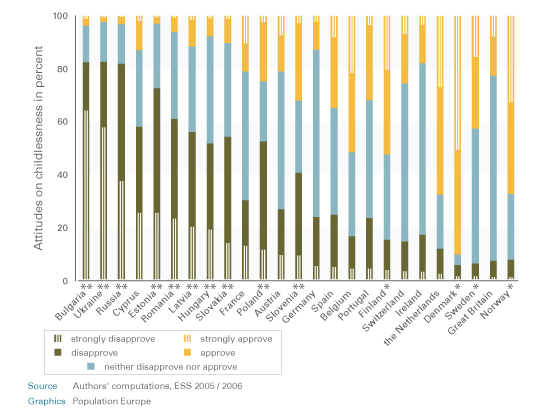Europeans are increasingly less likely to see childlessness as a problem. Interestingly, gender equality within a society plays a key role. The demographers Eva-Maria Merz and Aart C. Liefbroer analysed the individual and cultural factors affecting attitudes.
In recent decades, more and more people in Europe have chosen not to have children. However, little is known about attitudes toward this behaviour. In their study, the researchers decided to measure attitudes toward voluntary childlessness and look at the factors that influenced people’s views. They based their analysis on a large-scale sample from all walks of life in 25 European countries (European Social Survey, ESS 2005-2006).
Country level predictors: gender equality
The researchers found that people were more likely to endorse childlessness in countries with higher levels of gender equality, such as in Scandinavia, than in countries with lower gender equality, such as in Southern and Eastern Europe (see figure 1). They explain this fact by pointing out that countries with high levels of gender equality place a greater emphasis on individual autonomy and decision-making, emancipation and modernisation.

Figure 1 – Distribution of attitudes toward childlessness across European countries. Scandinavian countries are marked with single, Eastern European countries with double asterisks.
Interestingly, the highest disapproval rates toward childlessness were found in Eastern European countries, even though these countries have seen an immense decline in fertility since the collapse of communism and the transition to a liberal market economy. The researchers suggest that, although fertility behaviour might have changed, people may want to retain their traditional values, including a positive attitude toward children, to help create a feeling of security.
In contrast, a country’s wealth in terms of its gross domestic product (GDP), and the level of childcare provision didn't appear to influence attitudes toward childlessness.
Personal factors: education, religion, age, and gender
Personal factors also play an important role. Younger and older respondents disapproved more of childlessness than middle-aged people. The researchers postulate that young people, particularly those who don’t already have children, may expect to later become parents themselves, and are therefore less tolerant of those who choose not to have children. As for older people, the oldest of the Europeans included in the survey had experienced two wars and had been raised in traditional family homes, which made having children a virtue. As such, they disapproved of those who remained childless.
Women had a more positive attitude toward childlessness than men. The researchers explain this based on the higher “opportunity costs” for women who choose to have children: They tend to have more to lose in terms of their career opportunities than men, should they decide to become parents.
Education and religious beliefs are important too: Respondents with higher educational levels viewed childlessness more positively than people who were less well educated. The researchers speculate that this was because people with higher levels of education tend to have a more tolerant and nuanced view of human behaviour, while also facing higher opportunity costs if they have children themselves. This makes them more tolerant of people who choose to remain childless.
Religious people, on the other hand, tended to disapprove of childlessness compared to their more secular peers, irrespective of denomination. The demographers explain this by pointing to the high value placed on marriage, childbearing and family life in all monotheistic denominations.
In sum, the highly educated, the religiously uncommitted and those who value autonomy across Europe are much more likely to approve of voluntary childlessness.
This volume has been published with financial support of the European Union in the framework of Population Europe.